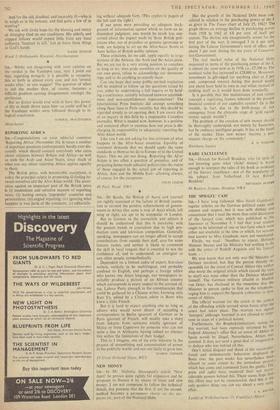SIR,— Dr Banda. the Bishop of Accra and yourself are
rightly exercised at the failure of British journa- lists to recount the positive achievements of govern- ments in Africa (the same is true of Asia) which, left wing or right, are apt to be unpopular in London.
But in fairness to the journalists and editors it should be understood that this is inevitable with the present trends in journalism due to high pro- duction costs and television competition. Generally speaking, newspapers can no longer afford to accept contributions from outside their staff, save for some famous names, and neither is likely to command the skill In local tongues that is essential to win the confidence of, and to understand, an emergent or any other people, sympathetically.
Dependent on a limited cadre of expert, first-class writers, unlikely to be multilingual, and probably confined to English, and perhaps a foreign editor who knows one Asian language, our newspapers in- evitably produce a picture of an African country which corresponds in every respect to the account of, say, Labour Party strength in the constituencies that could be gathered by a Chinese writer, knowing only Kuo Yu, edited by a Chinese editor in Bonn who knew a little French.
But it is hard to expect anything else so long as editors who would never dream of accepting a correspondent in Berlin ignorant of German or in Paris ignorant of French, will readily take a story from Jakarta from someone totally ignorant of Malay or from Capetown by someone who can not write a line in Afrikaans, having indeed no alterna- tive within the limitations of their budget.
This is, I imagine, one of the evils inherent in the process of streamlining and concentration of power in the publicity world; and not one likely to grow less.
GEORGE EDINGER










































































 Previous page
Previous page